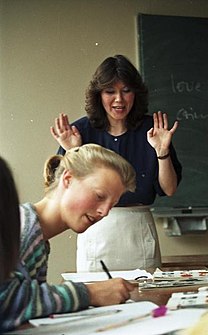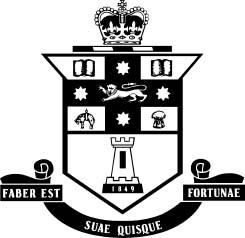
The University of Technology Sydney (UTS) is a public research university located in Sydney, Australia. Although its origins are said to trace back to the 1870s, the university was founded in its current form in 1988. As of 2018, UTS enrolls 45,930 students, including 33,070 undergraduate and 12,860 postgraduate students through its 9 faculties and schools.

Lecturer is an academic rank within many universities, though the meaning of the term varies somewhat from country to country. It generally denotes an academic expert who is hired to teach on a full- or part-time basis. They may also conduct research.
Senior lecturer is an academic rank. In the United Kingdom, Ireland, New Zealand, Australia, and Switzerland, lecturer is a faculty position at a university or similar institution. The position is tenured and is roughly equivalent to an associate professor in the North American system.
Southern Cross University (SCU) is an Australian public university, with campuses at Lismore and Coffs Harbour in northern New South Wales, and at the southern end of the Gold Coast in Queensland.
Rowan Cahill is an Australian radical historian and journalist, with a background as a teacher and farmhand, who variously worked for the trade union movement as a rank and file activist, delegate and publicist.
Stuart Forbes Macintyre is an Australian historian, and a former Dean of the Faculty of Arts at the University of Melbourne. He has been voted one of Australia's most influential historians.
Hugh Francis Durrant-Whyte is a British-Australian engineer and academic. He is known for his pioneering work on probabilistic methods for robotics. The algorithms developed in his group since the early 1990s permit autonomous vehicles to deal with uncertainty and to localize themselves despite noisy sensor readings using simultaneous localization and mapping (SLAM).
Glyn Conrad Davis AC is a Distinguished Professor at the Australian National University's Crawford School of Public Policy. From January 2005 until September 2018 he served as the Vice-Chancellor of the University of Melbourne.
The ELTons are international awards given annually by the British Council that recognise and celebrate innovation in the field of English language teaching. They reward educational resources that help English language learners and teachers to achieve their goals using innovative content, methods or media. The ELTons date from 2003 and the 2018 sponsors of the awards are Cambridge English Language Assessment and IELTS. Applications are submitted by the end of November each year and they are judged by an independent panel of ELT experts, using the Delphi Technique. The shortlist is published in March and the winners announced at a ceremony in London in June. The 2018 awards will be held in a new venue, Savoy Place, Institute of Engineering and Technology, London, UK.
Peter Freebody is an Honorary Professor and formerly a Professorial Research Fellow with the Faculty of Education and Social Work and a core member of the CoCo Research Centre at The University of Sydney in Sydney, Australia. He is also an Honorary Professorial Fellow at the University of Wollongong. His research and teaching interests include literacy education, classroom interaction and quantitative and qualitative research methods. He has served on numerous Australian State and Commonwealth literacy education and assessment advisory groups. Freebody, with Allan Luke, originated the Four Resources Model of literacy education. and Freebody, P.(1992). A socio-cultural approach: Resourcing four roles as a literacy learner. In A. Watson & A. Badenhop (Eds.) Prevention of reading failure. Sydney: Ashton Scholastic,.
In the U.S., "professors" commonly occupy any of several positions in academia, typically the ranks of assistant professor, associate professor, or professor. The same terms are used outside the U.S., although they often denote different roles than in the U.S. system. The majority of university lecturers and instructors in the United States, as of 2015, do not occupy these tenure-track ranks, but are part-time adjuncts.
Samy A. Azer is an Egyptian-born Australian physician and medical educator who has made an input to medical education internationally.
Richard (Dick) L. Allington is an American scholar and researcher at the University of Tennessee at Knoxville where he has been a Professor of Education since 2005.
Academic personnel, also known as faculty or academics, are the staff of a university: professors of various ranks, lecturers, and/or researchers. The term faculty in this sense is most commonly used in this context in the United States and Canada, and generally includes professors of various ranks: adjunct professors, assistant professors, associate professors, and (full) professors, usually tenured in terms of their contract of employment. In British and Australian/NZ English "faculty" usually refers to a university's department, not to the employees.
Harold Arthur Kinross Hunt was an Australian educationist who was Professor of Classical Studies at the University of Melbourne and Dean of the Faculty of Arts. He was a Foundation Fellow of the Australian Academy of the Humanities.
Trevor H. Cairney is an adjunct professor of education at the University of New South Wales Australia and President of the NSW Business Chamber. As an author, he has written widely on early learning, training, language acquisition and development. His work includes nine books and over 200 reports, articles and book chapters collected by libraries. Cairney was awarded an Order of Australia Medal in 2012.
Professor Tom Lowrie was appointed a Centenary Professor at the University of Canberra, Australia, in 2014. He has an established international research profile in the discipline area of mathematics education.
Academic ranks in Canada are the titles, relative importance and power of professors, researchers, and administrative personnel held in academia.
Joan Errington Beaumont is an Australian historian and academic, who specialises in foreign policy and the Australian experience of war. She is professor emerita in the Strategic and Defence Studies Centre at the Australian National University.
Adjunct professor is a type of academic appointment in higher education.







